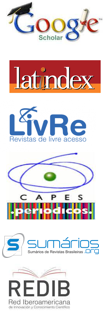Conceitos, Teoria e Prática do Currículo e suas Inovações
DOI:
https://doi.org/10.17921/2447-8733.2020v21n4p371-375Resumo
Resumo
Este artigo parte das discussões sobre a interpretação do currículo como um programa e argumenta que ele deve ser visto como um processo que envolve múltiplas relações. Essas relações são explícitas e implícitas e estão presentes em diversos domínios, que vão da prescrição à ação, das resoluções administrativas às práticas pedagógicas nas instituições escolares, aliando teoria e prática. Portanto, são abordados diferentes âmbitos curriculares: currículo prescrito, currículo moldado, currículo em ação, currículo percebido, currículo avaliado. Além disso, apresenta-se uma pesquisa bibliográfica com resultados de estudos nacionais e internacionais que analisam inovações curriculares à luz da Andragogia. As pesquisas Nacionais e Internacionais sobre inovações curriculares do Ensino Superior identificaram a necessidade de elaboração de currículos flexíveis, centrados na problematização da prática. Identifica-se também experiências de inovações curriculares que utilizaram metodologias ativas e simulações que aproximaram a teoria da prática, levando em conta desafios futuros para as profissões. Nesse sentido, os estudos aqui analisados indicam que a prática deverá ser o núcleo estrutural do currículo a partir de vivências e estudos de caso. Além disso, deverá incluir, por exemplo, o desenvolvimento de currículos a partir de objetos de aprendizagem, softwares e outros recursos tecnológicos que favoreçam a análise das práticas referidas e o acompanhamento a distância.
Palavras-chave: Desenvolvimento Curricular. Educação Superior. Inovação Educacional. Andragogia.
Abstract
This article is based on discussions on the interpretations of the curriculum as a program, and argues that it should be meaningful as a process involving multiple relationships. These relationships are explicit and implicit and are present in several domains, ranging from prescription to action, from administrative resolutions to pedagogical practices in school institutions, combining theory and practice. Therefore, different areas of the curriculum they are addressed: prescribed curriculum, molded curriculum, curriculum in action, perceived curriculum, and evaluated curriculum. In addition, a bibliographic research is presented with results of national and international studies that analyze curricular innovations in the light of Andragogy. National and international investigations on curricular innovations in Higher Education identified there is a need of Higher Education to elaborate flexible curricula, focused on questioning the practice. It also experiences of curricular innovations were also identified using active methodologies and simulations that brought theory closer to practice taking into account future challenges for the professions. In this sense, the studies analyzed here indicate that practice should be the structural core of the curriculum based on experiences and case studies. In addition, it should include, for example, the development of curricula based on learning objects, software and other technological resources that favor the analysis of the referred practices and remote monitoring.
Keywords: Curricular Development. Higher Education. Educational Innovation. Andragogy.


